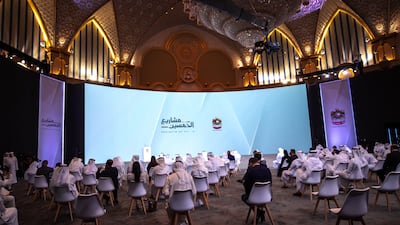Since its establishment in 1971, the UAE has been a fast-evolving country. In recent years, new branches of government have emerged to realise increasingly ambitious plans to make the country a world-leading example of economic diversity, openness and tolerance.
In 2016, the post of the Minister of State for Tolerance was created. This year, the government announced a new industrial strategy, Operation 300bn, which aims to more than double the industrial sector's contribution to the economy. Just this month, 50 major government projects are being rolled out incrementally to do the same. One is a plan to get 75,000 Emirati nationals into the private sector in the next five years.
Yesterday, a cabinet reshuffle revealed the ministers that will be at the heart of driving this evolution. Major new appointments include Sheikh Maktoum bin Mohammed as Deputy Prime Minister and Minister of Finance, and Mohamed Al Hussaini was made Minister of State for Financial Affairs.

Work is also underway to adapt ministerial portfolios to create posts that further correspond to today's challenges. An important example is the updated role of Mariam Al Mheiri, who has been made Minister of Climate Change and Environment. The move is in line with the government's ambitions; earlier this year, Ms Al Mheiri was involved with Dubai's launch of Food Tech Valley, a major new food technology hub that intends to become a global destination for enterprising food production businesses, and act as a key driver of the emirate's increasingly diversifying economy. But Ms Al Mheiri will also continue her previous post as Minister of State for Food Security, a sign that the government, which is investing heavily in both areas, views food security and environmental challenges as interlinked.
Adapting the ministries themselves is part of a longer-term plan to make governance flexible in an unpredictable world. Announcing the new cabinet, Sheikh Mohammed bin Rashid, Vice President and Ruler of Dubai, said that it will reflect a change in the UAE's approach to development. “The next cycles of change will be flexible and fast (between six months to two years), unlike the previous strategic cycles which used to last five to 10 years”, he said.
The government will try to shift ministerial working cultures away from “individual responsibility to shared responsibility among the field teams", part of an ongoing strategy to the make the work of government more transparent. Earlier this month, the UAE published a list of the five best-performing ministries, as well as the five those most in need of improving. The latter were given 90 days to do so.
The main aspects of the reshuffle are, as always, the people that sit at the Cabinet table. But yesterday's was also about the country's plans to evolve the way Emirati government works going into the next 50 years. Greater transparency, adaptability and long-term planning will, the government believes, be key qualities that help the country deal with a very different future to the one it confronted in its first five decades.

